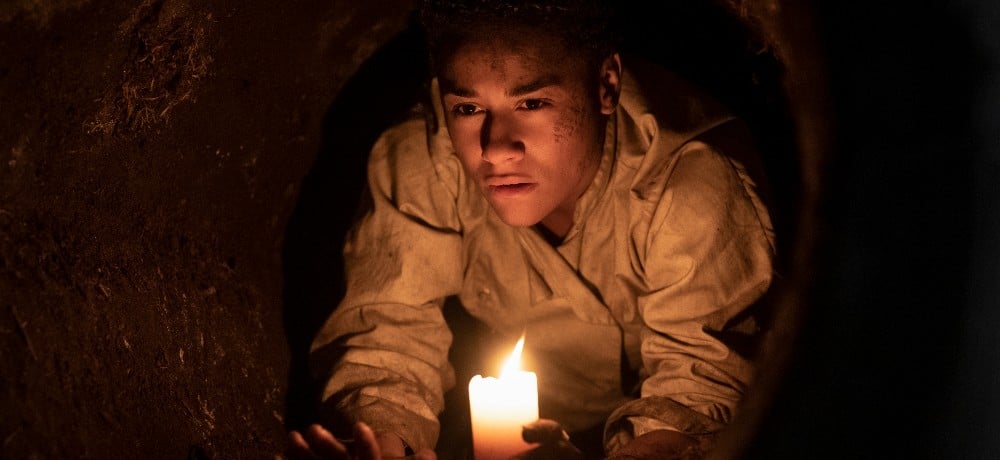


Delicious food, darkened bruja folklore, and Ariana DeBose? House of Spoils is a complete meal, albeit smaller bites. Filmmakers Bridget Savage Cole and Danielle Krudy lose themselves in witch’s brew of naturalistic psychological horrors, filtered through the cutthroat business of restauranteurship. Don't expect The Menu — Cole and Krudy find salvation in soil borne worship that connects with Mother Nature's literal roots. There's so much power in thematic ideas, yet storytelling feels restrained in unfortunate ways. Cole and Krudy replicate Chef's Table cinematography as immaculate dishes head to tables, juxtaposed against unappetizing rotten visuals. However, there's an apprehension that leaves the audience still craving something more.
Ariana DeBose stars as a driven New York City chef who gambles her career on a scenic upstate restaurant. She ditches Tauras, comfortable paychecks, and her mentor Marcello (Marton Csokas) for entrepreneurial partner Andres (Arian Moayed) and a haunted house in the middle of nowhere. DeBose's unnamed boss-lady dreams of proving herself by developing a menu visitors will drive hours to experience. Her early efforts are thwarted by mold outbreaks and wanderers in outside woods, dooming an investor’s preview. Andres gives his hire two weeks to blow him away with culinary perfection, or she's fired — and that's when the territory's secrets come alive.
Cole and Krudy do not hide that House of Spoils is some "women in the woods" witchiness. The first scene establishes lore, where a haggish figure muddling gunky animal organs transitions to a shot of steak being seared in an industrial kitchen. DeBose's line cook has fought her way to the semi-top of a male-dominated industry but still finds herself at the mercy of "big dick swingers," where the title house's history ties back to a coven of women gone wild (as per local whispers). Outside ingredients rot inside DeBose's new workspace, forcing a reliance on fresh produce growing all around. There's no mincing of themes as Cole and Krudy cast a spell over DeBose's creations that morph from culinary school techniques to rustic stews and funky crustiness. DeBose is being drafted into the previous owner's congregation, and the film's mystery becomes answering whether that's good or bad.
House of Spoils maximizes its cinematic representation of culinary arts, taking cues from current examples like The Menu and The Bear. All the tension of speed-chopping vegetables engenders fingers, while greyish, greenish fungal outbreaks turn delicious bites into repulsive visuals. The symbolism of large pots resembling cauldrons or how DeBose's physicality morphs from a stiffly postured "Yes, chef" type to a shamanistic provider whose entire body gyrates with each emphatic stir. The evolution from on-edge to soulfully connected explores the chef's relationship with food and an artist’s perfectionist obsession with overcomplication, all while hauntings occur worth a snicker. It's nothing revolutionary but slickly composed — enough to keep audiences captivated.
DeBose leads House of Spoils like a kitchen general, capturing the brute intensity it takes to succeed in high-pressure service scenarios — especially as a woman in a male-dominated industry. The way she surrenders herself to the essence flowing through an antique building preserved in vines and gaudy wallpaper is elegant and feral. Arian Moayed's business-minded antagonist gives DuBose plenty of snarky pushback moments, while Barbie Ferreira's go-getting sous-chef eases into a mentee role that allows DuBose’s character to reflect on internalized misogyny. There's a delicate conversation about women fighting for fewer positions and sprouting rivalries that can appear rotted in the underlying subplot about witchcraft. Cole and Krudy tone down the film's horrors so DuBose can run rampant through thematic perils bred in kitchen spaces, which is both a blessing and a curse. All the industry attitude of filets so beautiful you want to "fuck” them and grueling chain-of-command scenarios are delivered by DuBose with a sharpened blade — but the real treat is watching a hardened chef shed her calloused by the end.
House of Spoils strives for a Michelin star, but the Blumhouse Television and Prime Video collaboration lacks a secret ingredient. While that's by intention, it's what's missing from a thinner experience begging for intensified horror flavors. The folkloric whimsy of DuBose's supernatural confrontations never bubbles over in a way that rewards introduced "dangers" in established storytelling. It's a safer take that invests in psychological discomfort with glancing blows, missing the soulfulness of a genre experiment left underdone in the middle. What it's saying about commune, naturalism, and womanhood is evident to a fault, never pushing farther than it has to — it's enough, but never more.
Cole and Krudy follow Prime Video's Blow the Man Down with a restauranteur's nightmare that wants to be more hopeful than frightening, which succeeds in its more straightforward formula. Presentations are wiped clean, and technical cuts are precise — there's just less meat on the bone than expected. House of Spoils is a showcase for DeBose, not a catastrophic plunge into Salem-level Coventry or a scared-silly feast. That might sell narrative ambitions short, but in no way sours an emotionally-powered chiller with earthy flavors.
Movie Score: 3.5/5